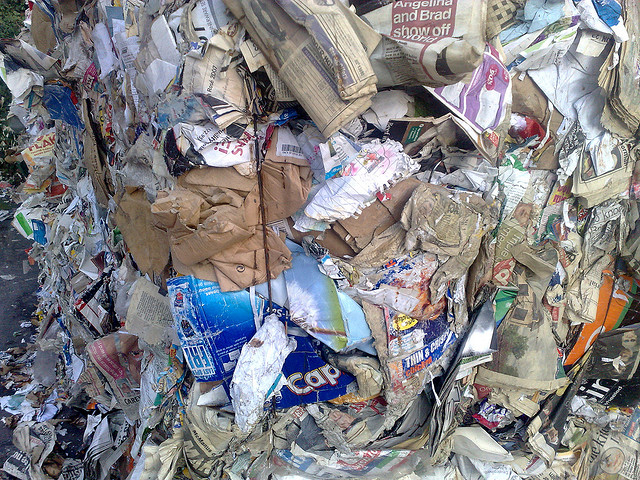Nelson and RDCK battle new province-wide recycling rules
UPDATE SEPTEMBER 6: It is no longer clear that city staff will recommend that council reject the MMBC proposal described below. This will become clear at the Council meeting on September 9.
The City of Nelson and the Regional District of Central Kootenay (RDCK) are scrambling to respond to a new mandatory recycling initiative in B.C.
There is a tight deadline looming, and the results could jeopardize the quality or frequency of curbside recycling in Nelson, make recycling more expensive for local governments, and lead to an overall reduction in waste diversion.
Senior staff at the city and at the RDCK say the two bodies should refuse to get involved in the Stewardship Plan for Packaging and Printed Paper put forward by a government–mandated industry agency, Multi-Material BC (MMBC). (SEE UPDATE NOTICE ABOVE)
Background
Starting in May of 2014, taxpayers in B.C. will no longer have to pay for pick-up or recycling of paper and packaging. The manufacturers who produce the waste will have to do that, as required by B.C.’s Recycling Regulation.
MMBC is a paper and packaging industry group authorized by the provincial government to run the new program.
This is part of the trend toward Extended Producer Responsibility, a concept that already has the relevant industries looking after recycling of bottles, batteries, pharmaceuticals, paint, and tires in B.C.
Paper and packaging is next on the list, scheduled to kick in next year.
Currently, Nelson’s recycling is a joint effort: the city picks it up at the curb and takes it to the transfer station near the airport. The RDCK takes it from there. All this is at taxpayers’ expense. Starting next year, MMBC will take over and the industry will pay the costs of recycling.
Click here to read an earlier story in The Nelson Daily that provides more background to this new initiative.
A difficult choice
By September 16, municipalities and regional districts across the province must notify MMBC whether they will:
1. continue to provide recycling services as they have done, and be paid to do so by MMBC at a non-negotiable per household rate that applies uniformly across the province, or
2. let MMBC provide the service. In this case MMBC would put it out to tender.
Higher costs could mean reduced service
The problem with option 1 for the RDCK is that the rate being offered by MMBC is lower than the current cost of providing the service.
“They insist that our recycling depots be staffed and fenced,” says the RDCK’s Raymond Gaudart, “and 23 out of the 27 depots in the RDCK are not staffed and fenced.”
He said this upgrade would require investment that the MMBC’s rate does not cover, so taxpayers would have to subsidize it or there would have to be a reduction in the number of depots.
In Nelson, the fee per household offered by MMBC also does not match the cost of providing the service, says city manager Kevin Cormack. He says the city would have to reduce service, it or would have to subsidize it, thereby contradicting the purpose of the program which is to make the producers of waste pay.
Unclear guidelines
Option 2 would create a joint problem for the RDCK and the city. Gaudart and Cormack say that so little is known about some aspects of the program that would be put to tender, that they cannot say at this time whether they want to choose this option.
The biggest unknown is the location of the drop-off point for recycling. Currently Waste Management Canada, a private companhy on contract with the RDCK, collects recycling at the transfer station by the airport. By sometime in 2014, the Nelson transfer station will no longer exist—this is a part of separate local plan to move it to Blewett.
If MMBC puts recycling out to tender (as in option 2 above), they will stipulate that the drop-off point may be anywhere within 60 kilometers of the pick-up point. Bidders must state where their drop-off point would be. If the the city of Nelson were to compete with a company that wants a single drop off point for the whole area in, for example, Castlegar, it would mean the extra expense of trucking the material to Castlegar. If the successful bidder is a private company, it could mean two trucks travelling the streets of Nelson, one picking up garbage and the other collecting recycling.
At least Cormack and Gaudart think that is what it could mean. They do not seem sure, and they blame MMBC for not giving them enough information. “I have been doing this kind of stuff for 20 years,” sayd Gaudart, “and I am still confused by this one.”
Penalties for “contamination”
In addition, MMBC will be levying new and unspecified penalties for contamination of recycling (unrecyclable materials mistakenly put in the blue bags or in the depot bins). The standards to be applied to this, and the amount of the penalty, are unknown, according to Cormack and Gaudart.
Prince George votes no
Many municipalities around the province are upset about the amount of the MMBC offer and other uncertainties, as outlined in a recent report by the Columbia Institute. Prince George city council voted to reject the MMBC conditions on August 27, and others are considering asking the provincial government to insist that MMBC set back the September 16 deadline and provide more details. The issue is expected to be a hot topic at the annual Union of B.C. Municipalities conference next week.
In the meantime, Nelson City Council on September 9 and the RDCK board on September 12 will each be met with a recommendation from their senior staff that they follow Prince George’s lead.
UPDATE SEPTEMBER 6: It is no longer clear that city staff will recommend that council reject the MMBC proposal. This will become clear at the Council meeting on September 9.

























